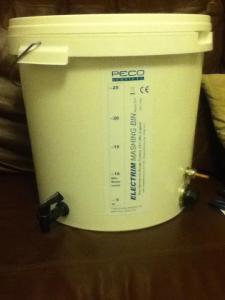This was Kev’s first solo brew on the new kit and the basic idea was to make a stout with a twist/something a little surprising in it. Following a disappointing recent experience with adding vanilla to a Porter (BIAB#18), he didn’t want to achieve that by using any ‘crazy’ ingredients and so ended up looking to introduce additional flavour and character through hops instead.
There was only really ‘hoption’ as far as Kev was concerned, and that was to go for Sorachi Ace. Sorachi Ace is certainly a hop that gets a lot of attention, and not only because of it’s kind of cool and distinctive name, but also because it delivers a lot of different flavour to the typical citrus, pine, etc. associated with high alpha, American varieties. While lemon/lemongrass is the characteristic generally associated with Sorachi Ace, Kev has always found it to have a lot of coconut to it as well and it was that aspect he hoped to capture in the finished beer. It felt like it might go well as an late/aroma hop in a stout.
Stouts are definitely our most brewed style and we’ve been using pretty much the same Stout recipe for a few brews now. It’s always been perfectly nice, but there have been some concerns it was a bit too dry and thin. As he was flying solo, Kev decided to go back to basics and develop a new recipe that might remedy that. And that is the recipe below:
Sorachi Squeak (25l)
Grain
5000g Pale Malt (74%)
500g Rolled Oats (7%)
300g Chocolate Malt (4%)
300g Roasted Barley (4%)
300g Caramalt (4%)
100g Carapils (2%)
75g Black Malt (1%)
150g Lactose was also added in the boil
Hops
15g Magnum @ First Wort Hop [11AA]
10g Sorachi Ace @ 30m [14.9AA]
25g Sorachi Ace @ 0m – 30m Hopstand
65g Sorachi Ace DRY HOP for 4 days
Yeast
White Labs 004 (Irish Ale Yeast) – 170ml of slurry (2nd Generation)
Vital Statistics
OG: 1.054
FG: 1.016
ABV: 5.2%
IBU: 37
SRM: 40
Tasting Notes
Really very happy with how this has turned out. The Sorachi notes in the beer are just what was hoped for… not overpowering or jarring in anyway, but unmistakably there. This adds a depth and an interest factor to the beer that makes for very pleasant drinking. And, yes, there’s definitely more coconut than lemon. For Kev anyway, but perhaps that’s just him?
As a first go at a new base recipe, it’s really not bad either. Could do with more body, but comments from Keith at Brewclub (@beifbrau) suggest that more oats, and swapping our some Pale for either Munich or Vienna, might help with that. The recipe definitely has a lot of promise and will be tinkered with in future.
